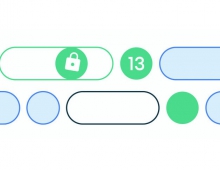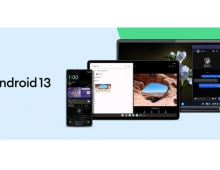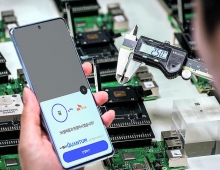
Google Introduces the 'Adiantum' Encryption for Low-end Android Smartphones
Google has designed a new encryption mode called Adiantum, an alternative to Advanced Encryption Standard (AES) for entry-level Android Go phones.
Today, Android offers storage encryption using the Advanced Encryption Standard (AES). Most new Android devices have hardware support for AES via the ARMv8 Cryptography Extensions. However, Android runs on a wide range of devices. This includes not just the latest flagship and mid-range phones, but also entry-level Android Go phones sold primarily in developing countries, along with smart watches and TVs. In order to offer low cost options, device manufacturers sometimes use low-end processors such as the ARM Cortex-A7, which does not have hardware support for AES. On these devices, AES is so slow that it would result in a poor user experience.
In HTTPS encryption, this is a solved problem. The ChaCha20 stream cipher is much faster than AES when hardware acceleration is unavailable, while also being extremely secure. It is fast because it exclusively relies on operations that all CPUs natively support: additions, rotations, and XORs.
For this reason, in 2014 Google selected ChaCha20 along with the Poly1305 authenticator, which is also fast in software, for a new TLS cipher suite to secure HTTPS internet connections. ChaCha20-Poly1305 has been standardized as RFC7539, and it improves HTTPS performance on devices that lack AES instructions.
However, disk and file encryption present a special challenge. Data on storage devices is organized into "sectors" which today are typically 4096 bytes. When the filesystem makes a request to the device to read or write a sector, the encryption layer intercepts that request and converts between plaintext and ciphertext. This means that Google has to convert between a 4096-byte plaintext and a 4096-byte ciphertext. But to use RFC7539, the ciphertext must be slightly larger than the plaintext; a little space is needed for the cryptographic nonce and message integrity information. There are software techniques for finding places to store this extra information, but they reduce efficiency and can impose significant complexity on filesystem design. Where AES is used, the conventional solution for disk encryption is to use the XTS or CBC-ESSIV modes of operation, which are length-preserving.
Adiantum allows us to use the ChaCha stream cipher in a length-preserving mode, by adapting ideas from AES-based proposals for length-preserving encryption such as HCTR and HCH. On ARM Cortex-A7, Adiantum encryption and decryption on 4096-byte sectors is about 10.6 cycles per byte, around 5x faster than AES-256-XTS, according to Paul Crowley and Eric Biggers, members of the Android Security & Privacy Team.

Android engineers have published a paper to prove that Adiantum has good security properties, under the assumption that ChaCha12 and AES-256 are secure. The paper entitled "Adiantum: length-preserving encryption for entry-level processors in IACR Transactions on Symmetric Cryptology" will be presented at the Fast Software Encryption conference (FSE 2019) in March.
Generic and ARM-optimized implementations of Adiantum are available in the Android common kernels v4.9 and higher, and in the mainline Linux kernel v5.0 and higher. Reference code, test vectors, and a benchmarking suite are available at https://github.com/google/adiantum.
Android device manufacturers can enable Adiantum for either full-disk or file-based encryption on devices with AES performance <= 50 MiB/sec and launching with Android Pie. Where hardware support for AES exists, AES is faster than Adiantum; AES must still be used where its performance is above 50 MiB/s.
In Android Q, Adiantum will be part of the Android platform, and Google intends to update the Android Compatibility Definition Document (CDD) to require that all new Android devices be encrypted using one of the allowed encryption algorithms.





















